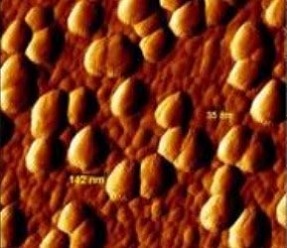Thailand medical researchers develop new nanocarrier to deliver curcumin directly to breast cancer cells
Nikhil Prasad Fact checked by:Thailand Medical News Team Sep 07, 2024 1 year, 5 months, 1 week, 5 days, 4 hours, 36 minutes ago
Thailand Medical: Unlocking Curcumin’s Potential in Targeting Breast Cancer with Nanocarriers
Breast cancer remains one of the most challenging diseases in medical science. Among the various therapies, finding targeted treatments that effectively reduce tumor growth while sparing healthy cells is critical. In this context, curcumin, a compound derived from turmeric, has been gaining attention for its anti-cancer properties. Curcumin is known to inhibit cell proliferation and induce cell death in cancerous cells, making it a promising candidate for cancer therapy.
 Thailand medical researchers develop new nanocarrier
Thailand medical researchers develop new nanocarrier
to deliver curcumin directly to breast cancer cells.
This article focuses on a recent study conducted by
Thailand Medical researchers from the Pharmaceutical Development of Green Innovations Group at Silpakorn University, Thailand. By developing nanocarriers conjugated with trastuzumab (a breast cancer-targeting antibody) through click chemistry, the researchers were able to improve curcumin's efficacy against HER2-positive breast cancer cells. The use of nanotechnology offers great promise for enhancing the bioavailability of curcumin, making it more effective in treating aggressive forms of breast cancer.
Curcumin's Role in Cancer Therapy
Curcumin, a naturally occurring polyphenol, has been long studied for its medicinal properties, particularly its anti-inflammatory, antioxidant, and anti-cancer activities. However, curcumin’s potential is often limited due to its poor solubility and rapid degradation in the body. To overcome these challenges, researchers have turned to drug delivery systems such as nanoparticles, which offer a way to improve curcumin's stability and effectiveness. Nanocarriers are especially appealing because they can be engineered to release curcumin in a controlled manner, allowing for better targeting of cancer cells.
Innovative Nanocarriers for Targeted Drug Delivery
In this study, the researchers designed nanocarriers using chitosan (CHI) and alginate (ALG), two biocompatible polymers known for their ability to form stable nanostructures. The nanocarriers were synthesized through a method called ionic gelation, where positively charged CHI interacts with negatively charged ALG to form nanoparticles. By modifying chitosan with maleimide (CHI-Mal) and alginate with thiol groups (SH-ALG), the researchers introduced a “click chemistry” mechanism that allowed for the efficient conjugation of trastuzumab (Tras), a monoclonal antibody used in breast cancer treatment.
The click reaction, specifically the thiol-maleimide reaction, is highly efficient and produces stable bonds, making it ideal for attaching drugs or antibodies to nanocarriers. In this case, trastuzumab was conjugated to the nanocarriers, enabling targeted delivery of curcumin directly to HER2-positive breast cancer cells. The result was a nanocarrier system (Tras-Cur-NCs) that could deliver curcumin with high precision, improving its therapeutic effect.
;
Key Findings of the Study
The study demonstrated several important findings. First, the nanocarriers exhibited a small size, around 107-240 nanometers, which is ideal for entering cancer cells and delivering the drug. The surface charge of the nanoparticles was slightly positive, which changed to slightly negative after the addition of curcumin and trastuzumab. This adjustment is crucial as it influences the interaction between the nanoparticles and cancer cells.
One of the most significant findings was the pH-responsive nature of the nanocarriers. Curcumin was released from the nanocarriers more quickly in an acidic environment (pH 5.5), which mimics the conditions found in tumors, compared to a neutral environment (pH 7.4) found in normal tissues. Over a period of seven days, the nanocarriers released 98% of the curcumin in the tumor-like environment, compared to just 57% in normal body conditions. This selective release ensures that the drug is delivered more effectively to cancer cells, minimizing the impact on healthy tissues.
Improved Cancer Cell Targeting
The researchers also examined the targeting efficiency of the nanocarriers. Using HER2-positive breast cancer cells (SK-BR-3), they compared the effectiveness of the curcumin-loaded nanocarriers with and without trastuzumab. The results were clear: the trastuzumab-conjugated nanocarriers (Tras-Cur-NCs) showed superior anticancer activity compared to free curcumin and non-targeted nanocarriers. The presence of trastuzumab facilitated the binding of the nanocarriers to the HER2 receptors on the cancer cells, enhancing the cellular uptake of curcumin and increasing its potency.
In addition to better targeting, the Tras-Cur-NCs demonstrated a more potent effect in inducing cell death through apoptosis, a process where cancer cells are programmed to die without causing inflammation. This is crucial in cancer therapy, as inducing apoptosis can prevent the spread of cancer without harming surrounding healthy tissues.
Conclusions: A Step Forward in Breast Cancer Treatment
The study's findings highlight the potential of using bioconjugated nanocarriers for targeted cancer therapy. By combining curcumin with trastuzumab in a nanocarrier system, the researchers were able to enhance the drug's delivery to HER2-positive breast cancer cells, improve its therapeutic effect, and reduce the likelihood of side effects on healthy tissues.
This approach opens new avenues for developing targeted therapies for breast cancer and potentially other types of cancer. The use of nanocarriers provides a versatile platform for delivering drugs more efficiently and could be adapted to incorporate other therapeutic agents in the future.
While the study presents promising results, further research is needed to refine the technology, particularly in terms of antibody conjugation and in vivo performance. The next steps will involve testing the system in animal models to evaluate its efficacy and safety in a more complex biological environment.
The study findings were published in the peer-reviewed journal: Carbohydrate Polymer Technologies and Applications.
https://www.sciencedirect.com/science/article/pii/S2666893924001439
For the latest news on medical research in Thailand, keep on logging
to Thailand Medical News.
Read Also:
https://www.thailandmedical.news/news/thailand-medical-researchers-find-that-the-probiotic-limosilactobacillus-reuteri-reduces-uti-bacteria-and-enhances-immunity
https://www.thailandmedical.news/news/thailand-medical-researchers-find-that-huperzine-a-from-huperzia-serrata-moss-can-help-combat-alzheimer-s-disease
